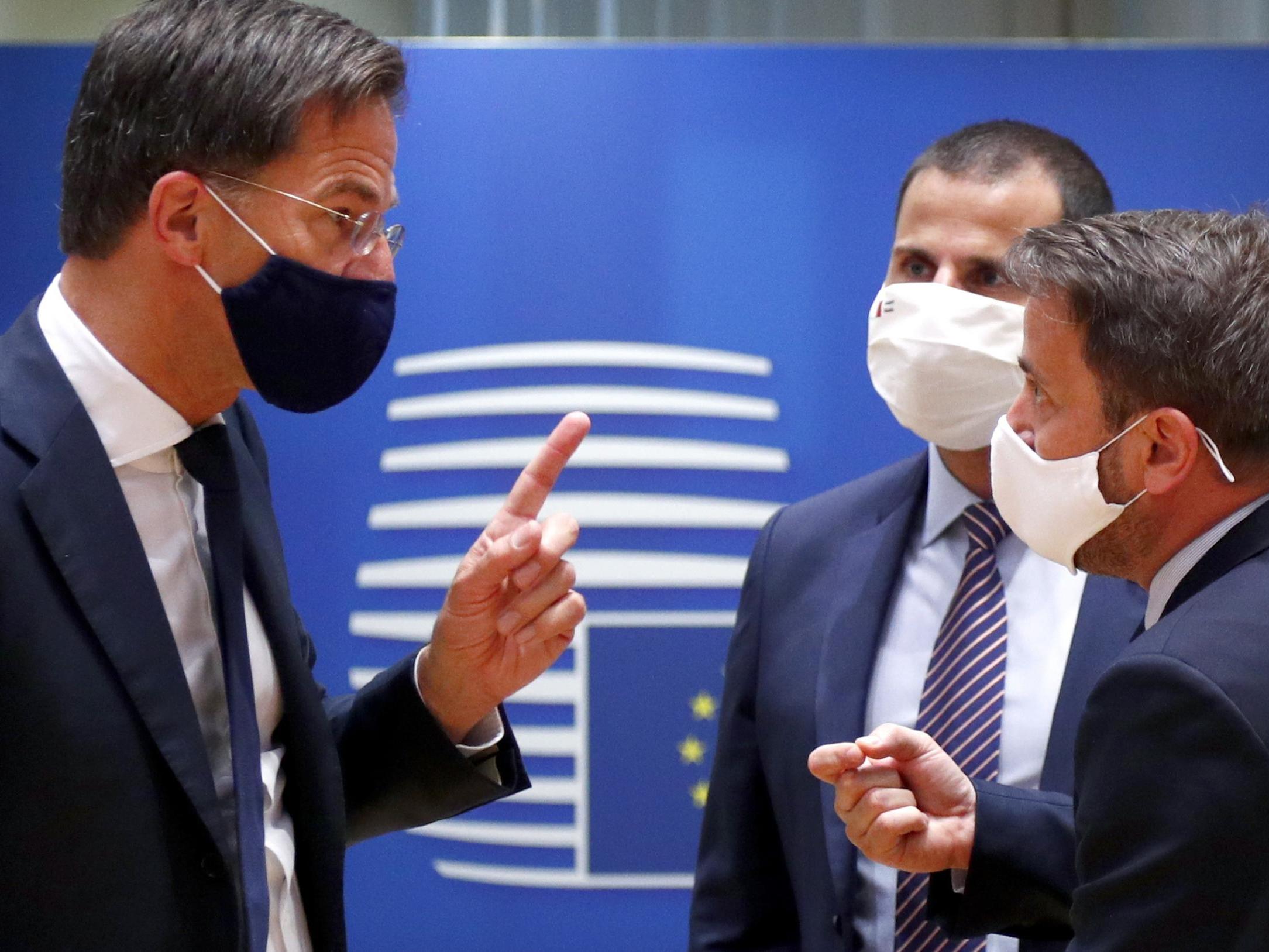EU leaders fail to agree as ‘grumpy’ budget and coronavirus fund talks enter second day
But Dutch hail ‘step in right direction’ during ‘moment of truth’ summit

Agreement between European Union leaders over a record €1.75 trillion (£1.59 trillion) budget deal and coronavirus recovery fund appeared a long-way off as the “grumpy” talks entered their second day, despite some signs of compromise.
After five months of virtual diplomacy, European politicians met face-to-face for the first time during the pandemic, which has seen borders effectively spring into force for the first time in decades as the bloc’s leaders’ calls for unity disappeared unheeded into its widening cracks.
The Brussels summit represents a moment of existential significance for the political future of the European project, having been described as France’s Emmanuel Macron’s as a “moment of truth” - warning “the populists will win” unless countries receive the necessary financial assistance.
And with many countries facing their worst economic hardship since the Second World War, the stakes are equally high for individual nations.
Before leaders met to hash out longstanding disagreements over the seven-year budget worth more than €1 trillion (£900 bn), and a €750bn (£682 bn) recovery fund, some diplomats reportedly described the Dutch as “the new British”, and the most significant stalling points on Friday – when talks lasted into the night – came from prime minister Mark Rutte.
But in a sign of potential promise, a Dutch diplomat on Saturday hailed new proposals circulated by European Council president Charles Michel as “a step in the right direction”.
In response to the pandemic, the executive European Commission is seeking a mandate to borrow billions of euros on capital markets for the first time.
One of the main points of contention is over who should control how the €750bn fund should be spent, with the Netherlands insisting upon strict conditions under which countries can receive funds.
Mr Rutte wants the money to be tied to welfare, tax and pension reforms, and to ensure that it will go towards improving and creating infrastructure and green investment.
“I’m doing this for the whole of Europe, because it is also in the interest of Spain and Italy that they emerge from this crisis with strength,” Mr Rutte told reporters early on Saturday, referring to the two EU countries most affected by the pandemic.
Fiscally conservative countries such as Austria, Denmark and Sweden are also adamant that any new debt should be strictly policed.
Bulgarian Prime Minister Boyko Borissov said he saw a route to a compromise by involving EU finance ministers in monitoring new debt, rather than just the European Commission.
But senior EU politician Guy Verhofstadt rejected involving finance ministers, raising concerned that the parliament might be sidelined. “The recovery fund cannot be a pretext to undermine EU democracy,” he said.
The leaders of France, Germany, the Netherlands, Spain, Italy and the Commission also held talks, meeting in a format once used to discuss Greek debt relief – an issue that dogged the bloc for years.
After the two fruitless sessions on Friday, Mr Michel also met key players - Mr Rutte, Mr Macron and Hungary's Viktor Orban - in an attempt to narrow the gaps between them.
While the Netherlands and its allies cited some progress with "more and more movement in our direction", the exact size of the new EU budget and how far to use payouts as leverage for reforms, or whether to withhold money from countries that fail to live up to democratic standards, were still to be resolved.
Saturday's talks concluded at around midday so that each delegation could discuss the new proposals.
A senior diplomat said: “The key question now is whether... we can move on to other issues. There will still need to be a discussion on volume, and that’s before we get into the rule of law.”
Hungary, backed by its eurosceptic, nationalist ally Poland, has threatened to veto the whole package over a new envisaged mechanism to freeze out countries flouting democratic principles.
Under Mr Michel's new proposals, the portion of grants in the €750bn recovery fund would be reduced to €450bn from €500bn.
They also call for an "emergency brake" on disbursement of funds, to appease states who want conditions attached to grants and would prefer to see those countries worst affected by the coronavirus crisis take loans.
The proposals would also increase rebates on the multi-year EU budget for Austria, Denmark and Sweden.
“We are not at the end of the negotiation, but this at least provides a basis for negotiation,” a second EU diplomat said.
Additional reporting by Reuters
Join our commenting forum
Join thought-provoking conversations, follow other Independent readers and see their replies
0Comments